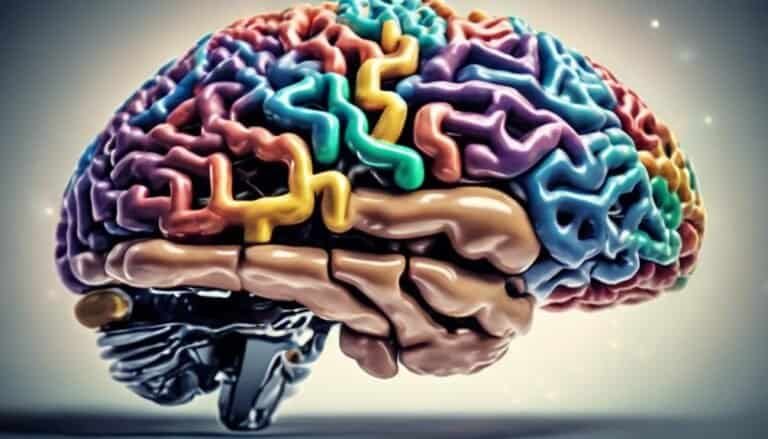Brain and Resilience Training
You might be thinking that resilience training requires a significant time commitment, but what if you could enhance your resilience without adding extra hours to your day?
By exploring the fascinating connection between the brain and resilience, you'll discover practical techniques that can transform how you navigate life's challenges.
Think of it as equipping your mind with tools to bounce back stronger from setbacks and thrive in the face of adversity.
Wouldn't it be empowering to unlock your brain's potential for resilience and well-being with simple yet powerful strategies?
Key Takeaways
- Engaging in challenging activities promotes brain plasticity for resilience.
- Stress management techniques like mindfulness enhance emotional regulation.
- Resilience training rewires neural pathways for better coping mechanisms.
- Facing challenges strengthens neural connections and fosters a growth mindset.
Understanding Brain Plasticity
Brain plasticity, also known as neuroplasticity, refers to the brain's ability to reorganize itself by forming new neural connections throughout life. This phenomenon plays a crucial role in brain rewiring, enabling individuals to adapt to new experiences, learn new information, and recover from injuries. Understanding brain plasticity is fundamental in resilience development, as it highlights the brain's capacity to change and adapt in response to various stimuli.
Research has shown that engaging in activities that challenge the brain, such as learning a new skill or language, can promote brain plasticity. These activities stimulate the formation of new neural connections, enhancing cognitive function and resilience. Additionally, experiences of stress and adversity can also impact brain plasticity, either by hindering or facilitating the brain's ability to reorganize itself.
Impact of Stress on Brain
When stress impacts the brain, it can significantly influence cognitive functions and emotional responses. Research suggests that neuroplasticity, the brain's ability to reorganize itself, can be both positively and negatively affected by stress.
Understanding coping mechanisms for stress is crucial in maintaining brain health and resilience in the face of challenging situations.
Stress and Brain Function
Chronic stress significantly impairs cognitive functions and neural plasticity in the brain. When stress becomes prolonged, it can have detrimental effects on your brain's ability to function optimally.
To mitigate the impact of stress on brain function, consider the following:
- Stress Management Techniques: Engage in activities such as mindfulness meditation, exercise, or deep breathing to help regulate stress levels.
- Emotional Wellness Practices: Cultivate a positive mindset, seek social support, and practice self-care to enhance emotional well-being.
- Healthy Lifestyle Choices: Ensure you're getting adequate sleep, eating a balanced diet, and staying physically active to support overall brain health.
Neuroplasticity and Stress
Prolonged stress can significantly impact the brain's neuroplasticity, affecting its ability to adapt and reorganize neural pathways efficiently. Chronic stress triggers a cascade of physiological responses that can hinder the brain's plasticity, the brain's ability to change and adapt in response to experiences. The stress response, primarily driven by the release of cortisol and other stress hormones, can lead to structural changes in the brain, particularly in areas responsible for memory, learning, and emotional regulation. Here is a table to illustrate the relationship between stress and brain plasticity:
| Stress Level | Effect on Neuroplasticity |
|---|---|
| Low | Promotes adaptive changes |
| Moderate | Can enhance learning |
| High | Disrupts neural connections |
Understanding how stress impacts brain plasticity is crucial for developing effective strategies to promote resilience and mental well-being.
Coping Mechanisms for Stress
Understanding effective coping mechanisms for stress is imperative to mitigate the impact of stress on the brain's neuroplasticity and overall cognitive function. Implementing strategies for stress management and resilience building is crucial for maintaining brain health.
When faced with stress, consider the following:
- Mindfulness Practices: Engaging in mindfulness meditation or deep breathing exercises can help regulate stress responses and promote emotional well-being.
- Physical Activity: Regular exercise not only reduces stress levels but also enhances cognitive function and resilience to future stressors.
- Social Support: Building a strong support network and connecting with others can buffer the negative effects of stress on the brain, fostering resilience and adaptive coping strategies.
Neuroplasticity and Resilience
When it comes to neuroplasticity and resilience, understanding the brain's adaptive changes is crucial.
By building mental strength, individuals can enhance their resilience to navigate challenges effectively.
Research suggests that resilience isn't merely a fixed trait but can be developed through intentional practices and experiences.
Brain's Adaptive Changes
Neuroplasticity, a fundamental aspect of the brain's adaptive changes, plays a crucial role in fostering resilience in individuals facing challenges. The brain's flexibility allows for the development of new neural pathways, contributing to resilience. This adaptability enables individuals to bounce back from adversity and learn from difficult experiences.
Neurological adaptations occur through various mechanisms, such as dendritic branching and synaptic pruning, enhancing resilience building. These changes enable the brain to rewire itself in response to stressors, strengthening resilience over time. Understanding the brain's adaptive capabilities can empower individuals to cultivate resilience through targeted practices and interventions, ultimately enhancing their ability to navigate life's inevitable ups and downs.
Building Mental Strength
To enhance mental strength and resilience, you can actively engage in practices that promote neuroplasticity, fostering adaptive changes in the brain. Mental toughness is developed through resilience training, which involves challenging the brain to adapt and respond effectively to stressors.
Research shows that engaging in activities like mindfulness meditation, cognitive behavioral therapy, and physical exercise can enhance neuroplasticity, leading to improved resilience. These practices help rewire neural pathways, enabling individuals to better cope with adversity and bounce back from setbacks.
Resilience Through Challenges
Developing resilience through facing challenges involves actively engaging in practices that promote neuroplasticity and foster adaptive changes in the brain. This process not only enhances your ability to overcome obstacles but also cultivates a growth mindset that can lead to long-lasting benefits. By confronting difficulties head-on, you're training your brain to rewire itself, strengthening neural connections, and increasing resilience.
Here is a deeper insight into how this process works:
- Adapting to Stress: Resilience training helps in adapting to and managing stress more effectively.
- Enhanced Problem-Solving Skills: Overcoming challenges builds problem-solving skills and enhances cognitive flexibility.
- Emotional Regulation: Developing resilience through challenges improves emotional regulation and coping mechanisms.
Cognitive Training Techniques
Utilizing specific cognitive training techniques has been shown to enhance brain function and resilience in various studies. Memory enhancement techniques play a crucial role in boosting cognitive performance. By engaging in activities such as mnemonic devices, spaced repetition, and visualization, individuals can improve their ability to retain and recall information effectively. Attention training is another key aspect that can lead to significant improvements in focus and concentration. Techniques like mindfulness meditation, attentional control exercises, and cognitive-behavioral strategies have been proven to enhance focus and cognitive performance.
To provide a clearer overview, the table below outlines some popular cognitive training techniques for memory enhancement and attention training:
| Memory Enhancement Techniques | Attention Training |
|---|---|
| Mnemonic Devices | Mindfulness Meditation |
| Spaced Repetition | Attentional Control Exercises |
| Visualization | Cognitive-Behavioral Strategies |
Mindfulness Practices for Resilience
Mindfulness practices have demonstrated significant effectiveness in enhancing resilience by promoting self-awareness and emotional regulation. These techniques not only help individuals cope with stress but also build psychological strength to navigate challenges effectively.
Here are three key ways mindfulness practices contribute to resilience:
- Enhanced Stress Management: Mindfulness techniques provide individuals with the tools to observe their thoughts and emotions without judgment, leading to decreased reactivity to stressors and improved coping mechanisms.
- Improved Emotional Regulation: By engaging in mindfulness exercises, individuals can strengthen their mental fortitude and develop a greater capacity to regulate their emotions, resulting in more stable emotional responses to adversity.
- Increased Self-Awareness: Mindfulness practices cultivate self-awareness by encouraging individuals to stay present in the moment, which allows for a deeper understanding of one's thoughts, emotions, and reactions. This heightened self-awareness facilitates better decision-making and adaptive responses to challenging situations.
Positive Psychology Interventions
Positive psychology interventions aim to enhance well-being and foster resilience through targeted strategies and practices. Resilience building is a key focus of these interventions, which are grounded in the principles of positive psychology. Research suggests that positive psychology practices can effectively boost resilience by cultivating positive emotions, enhancing social connections, and fostering a sense of purpose in individuals. These interventions often include activities such as gratitude journaling, acts of kindness, mindfulness meditation, and strengths-based interventions. By engaging in these practices, individuals can develop a more optimistic outlook, improve their ability to cope with stress and adversity, and enhance their overall well-being.
Studies have shown that positive psychology interventions not only promote resilience but also have a lasting impact on mental health outcomes. By incorporating these practices into daily routines, individuals can build psychological resources that enable them to navigate challenges more effectively. Embracing the principles of positive psychology can empower individuals to cultivate resilience and thrive in the face of adversity.
Building Emotional Regulation Skills
To enhance your emotional regulation skills, incorporating structured mindfulness practices can be beneficial. Mindfulness helps you become more aware of your emotions, allowing you to observe and understand them without judgment. This increased self-awareness is crucial in developing emotional intelligence, which is the ability to recognize and manage your emotions effectively.
Here are three key strategies to help you build your emotional regulation skills:
- Self Care Practices: Engaging in self-care activities like exercise, proper nutrition, and sufficient rest can significantly impact your emotional well-being. Taking care of your physical health can have a positive effect on your emotional state.
- Emotional Awareness Exercises: Practicing exercises that enhance your emotional awareness, such as journaling or guided reflection, can help you identify triggers and patterns in your emotions. This self-reflection is essential for developing emotional regulation skills.
- Mindfulness Meditation: Regular mindfulness meditation can train your brain to respond to emotions in a more balanced manner. It teaches you to observe your thoughts and feelings without getting caught up in them, fostering better emotional regulation.
Strategies for Adversity Resilience
Enhancing your emotional regulation skills through structured mindfulness practices can serve as a foundation for developing effective strategies for building resilience in the face of adversity. Resilience workshops offer structured environments where individuals can learn coping mechanisms to navigate challenges and setbacks. These workshops often focus on enhancing problem-solving skills, fostering social support networks, and promoting a positive outlook in the face of adversity. By participating in these workshops, individuals can cultivate an adversity mindset, which involves viewing obstacles as opportunities for growth and learning rather than insurmountable barriers.
Research suggests that individuals who actively engage in resilience workshops tend to exhibit greater emotional resilience and adaptive coping strategies when faced with difficult situations. These workshops provide a platform for individuals to practice resilience-building techniques in a supportive environment, allowing them to develop the skills necessary to bounce back from adversity effectively. By fostering a proactive approach to adversity, resilience workshops empower individuals to confront challenges with confidence and resilience.
Implementing Daily Resilience Habits
Developing consistent daily habits that promote resilience is essential for effectively navigating life's challenges and setbacks. Daily routines play a crucial role in shaping your ability to bounce back from adversity and manage stress effectively.
Here are three key habits you can incorporate into your daily routine to enhance resilience:
- Mindfulness Practices: Engaging in mindfulness activities such as meditation or deep breathing exercises can help you cultivate a sense of calmness and focus, reducing the impact of stressors on your mental well-being.
- Physical Exercise: Regular physical activity not only improves your physical health but also boosts your mood and mental resilience. Exercise releases endorphins, the body's natural stress relievers, helping you cope better with daily stressors.
- Healthy Sleep Patterns: Prioritizing quality sleep is vital for resilience. Adequate rest allows your brain to recharge, enhances cognitive function, and equips you to tackle challenges with a clear mind, reducing the likelihood of being overwhelmed by stress.
Incorporating these habits into your daily routine can significantly improve your ability to navigate life's ups and downs with resilience and strength.
Conclusion
In conclusion, brain and resilience training can truly transform your ability to bounce back from life's challenges.
By understanding the power of neuroplasticity and implementing cognitive techniques, mindfulness practices, and positive psychology interventions, you can build a strong foundation for emotional regulation and resilience.
With daily habits that promote mental flexibility and adaptability, you can truly unleash the full potential of your brain and navigate through adversity with ease.
The possibilities for growth and resilience are endless!







